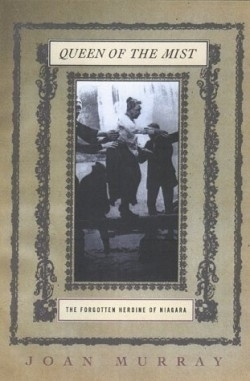Queen of the Mist
As runner-up for Poetry Society’s Alice Fay di Castagnola Award, this is a beautiful narrative poem about Annie Taylor, the intrepid woman who, for the first time, shot Niagara Falls in 1901. It is a wonderful book; fresh and historical, accessible and true to its complex speaker. The poem-story begins in the first person, with Annie Taylor speaking to the reader of her experience in her barrel, focusing on the moment of transformation, the moment when, in facing death in the fierce and majestic Niagara, she feels herself born into a new being. From there, in a direct but rhythmic voice, Murray speaks of the time leading up to Annie’s experience at the Falls. Then, with touching awareness of an older, single woman’s role in turn of the century society, the author reveals the hardships that follow Annie’s brave act. Because Annie Taylor was an older woman, confident, unprepossessing, private and plain, she was never viewed as the right material for a heroine in the sensationalist-laden journalism of the early 1900s. It is the tale of her struggle for recognition that makes this haunting story-poem so powerful.
What lies behind Annie’s story is the contradiction of how one human being shaped herself in an exceptional way, but because she did not communicate that experience as was expected of her, cut herself off from the world which she desperately needed to survive. Murray’s potent interpretation of Annie Taylor’s history has as much to do with human willingness to compromise honesty for attention and financial success as with Annie’s unwillingness to do so. In the final ghost-ridden sections of Annie’s life, we hear not only the unpretentious and courageous vision of her own life, but the apocalyptic voice of the river itself, seeing a future beyond Annie and humanity.
In clear and respectful music Murray has given us back a wonderful woman long lost to history. Murray’s reclamation work as well as her final prophetic tone should be honored. This thought-provoking and rewarding narrative is not only for readers of poetry, but for readers of prose who enjoy historical-based works.
Reviewed by
Anne-Marie Oomen
Disclosure: This article is not an endorsement, but a review. The publisher of this book provided free copies of the book to have their book reviewed by a professional reviewer. No fee was paid by the publisher for this review. Foreword Reviews only recommends books that we love. Foreword Magazine, Inc. is disclosing this in accordance with the Federal Trade Commission’s 16 CFR, Part 255.

